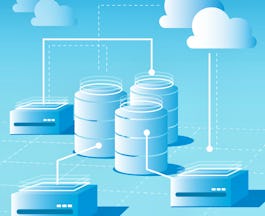Filter by
The language used throughout the course, in both instruction and assessments.
1,773 results for "business intelligence"

University of California, Irvine
Skills you'll gain: Data Model, Business Intelligence, Data Analysis, Data Management, Databases, Data Warehousing, Database Design, Data Visualization, Extract, Transform, Load, Basic Descriptive Statistics, Big Data, Business Analysis, Data Visualization Software, Data Analysis Software, Data Mining, Data Structures, Exploratory Data Analysis, SAS (Software), SQL, Statistical Analysis

Rutgers the State University of New Jersey
Skills you'll gain: Business Analysis, Business Intelligence, Data Analysis, Market Analysis, Supply Chain Systems, Business Process Management, Business Research, Data Management, Operational Analysis, Strategy and Operations

Skills you'll gain: Data Analysis, Data Management, Data Structures, Data Visualization, Databases, Python Programming, SQL, Big Data, Data Mining, Data Science, NoSQL, R Programming, Microsoft Excel

Rice University
Skills you'll gain: Probability & Statistics, Statistical Analysis, Business Analysis, General Statistics, Data Analysis, Spreadsheet Software, Basic Descriptive Statistics, Microsoft Excel, Statistical Tests, Probability Distribution, Business Intelligence, Data Analysis Software, Regression, Data Management, Critical Thinking, Data Visualization, Plot (Graphics), Statistical Visualization, Decision Making

Skills you'll gain: Python Programming, Data Science, Machine Learning, Data Analysis, Algorithms, Data Analysis Software, Data Management, Data Visualization, Database Design, Human Learning, R Programming, Computer Programming, Database Administration, Database Application, Databases, Deep Learning, Exploratory Data Analysis, Machine Learning Algorithms, Plot (Graphics), SQL, Data Model, Statistical Machine Learning, General Statistics, Probability & Statistics, Regression, Reinforcement Learning, Big Data, Cloud Computing, Data Mining, IBM Cloud, Writing

University of California, Irvine
Skills you'll gain: Business Intelligence, Data Visualization Software, Data Analysis, Data Analysis Software, Data Visualization, SAS (Software), Data Warehousing

University of Colorado System
Skills you'll gain: Business Analysis, Business Intelligence, Data Visualization

ESSEC Business School
Skills you'll gain: Business Analysis, Data Analysis, Statistical Analysis, Probability & Statistics, Customer Analysis, Market Analysis, Marketing, R Programming, Data Management, Exploratory Data Analysis
 Status: Recently Updated
Status: Recently UpdatedSkills you'll gain: Cloud Computing, Cloud Platforms, Collaboration, Computer Programming, Data Structures, Google Cloud Platform, Leadership and Management, Problem Solving, Python Programming

University of California, Irvine
Skills you'll gain: Data Model, Data Warehousing, Data Analysis, Data Management, Basic Descriptive Statistics, Big Data, Business Intelligence, Data Mining, Database Design, Databases, Exploratory Data Analysis, Statistical Analysis

Coursera Project Network
Skills you'll gain: Business Intelligence, Data Analysis, Data Visualization, Interactive Data Visualization, Power BI

Rutgers the State University of New Jersey
Skills you'll gain: Data Analysis, Supply Chain Systems, Supply Chain and Logistics, Strategy and Operations, Leadership and Management, Inventory Management, Operations Management, Business Analysis, Planning, Operational Analysis, Market Analysis, Strategy, Business Intelligence, Process Analysis, Business Process Management, Forecasting, Warehouse Management, Data Management, Probability & Statistics, Statistical Analysis, Decision Making, General Statistics, Statistical Visualization, Data Model, Regression, Business Research, Statistical Tests, Basic Descriptive Statistics, Data Visualization, Data Science
Searches related to business intelligence
In summary, here are 10 of our most popular business intelligence courses
- Database Design and Operational Business Intelligence: University of California, Irvine
- Business Intelligence and Competitive Analysis: Rutgers the State University of New Jersey
- Introduction to Data Analytics: IBM
- Business Statistics and Analysis: Rice University
- IBM Data Science: IBM
- Business Intelligence and Visual Analytics: University of California, Irvine
- Business Intelligence Concepts, Tools, and Applications: University of Colorado System
- Strategic Business Analytics: ESSEC Business School
- Google IT Automation with Python: Google
- Data Warehousing and Business Intelligence: University of California, Irvine










